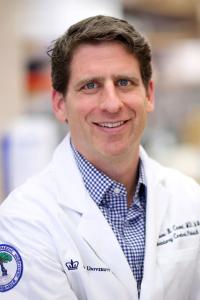Early Detection and Treatment of Cerebral Palsy
CP is defined as an injury to the developing brain, and that damage usually occurs before, during, or soon after birth. However, the impairment of movement or posture is often not recognized until the child is 18 months or older. Early detection helps families to get the services they need to improve the course of the condition. The Weinberg Family Cerebral Palsy Center (WFCPC) has teamed up with the Division of Neonatology and the Cerebral Palsy Foundation to improve the early diagnosis and treatment of CP.
Columbia cares for the most fragile neonates, those whose premature birth or medical conditions put them at high risk for cerebral palsy. For vulnerable children, the neonatal ICU instituted a special follow up clinic. The clinic addresses all of the medical needs of the child, from neurodevelopment to breathing and nutrition, which are common problems of prematurity. Some of the children in the clinic develop cerebral palsy; however, there wasn’t a direct link to WFCPC in any formal way, until now.
“The mission of the CP Center is to provide care throughout the life of a person living with CP,” said Jason Carmel, MD, PhD, Director of the WFCPC. “I am thrilled that this partnership will allow seamless care from the neonatal ICU through childhood and into maturity.”
WFCPC and the Columbia Neonatal Neurodevelopmental Follow-Up Program, in conjunction with the Cerebral Palsy Foundation, have instituted an early detection program for cerebral palsy in collaboration with Anna Penn, MD, PhD, the Director of Neonatology, a leading developmental neuroscientist, and L. Stanley James Associate Professor of Pediatrics. A Cerebral Palsy Foundation funded study showed that careful detection methods can decrease the age infants are diagnosed from 19.5 months to 9.5 months by recording their movements and using validated scales to rate the number and quality of those movements. Early detection of cerebral palsy is extremely important since early interventions can make a difference in the wellbeing of children with cerebral palsy.
“Early detection of cerebral palsy or high risk of CP is very important to families and implementing this program will improve our ability to provide rehabilitative services as soon as possible” said Dr. Penn “It is very exciting to see programs come together across Columbia to support our smallest patients and their families and to continue to care for them across their lifetime if they need our help.”
WFCPC also aims to bridge the gap for children from the neonatal ICU to pediatrics and beyond via the work of Dr. Lisa Yoon, a Board-Certified Pediatric Physical Therapist and Assistant Professor at Columbia University Irving Medical Center. Dr. Yoon, through her special interest in infants with impaired movement and in children with CP, started working in the neonatal follow up clinic in July. Her role is to help with the early detection of CP, and provide short-term care to pediatric patients. Dr. Yoon will also track their development in the neonatal follow up clinic as they transition to care in the WFCPC . This collaboration ensures children and their families obtain an early diagnosis of CP and begin services that helps them reach their highest potential of function and independence.
“I am thrilled to work with Jason, Anna, WFCPC and the neonatal follow up team” said Yoon. “This role links my clinical passions—infants and CP—that ultimately serves to improve care for patients.”

